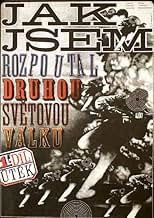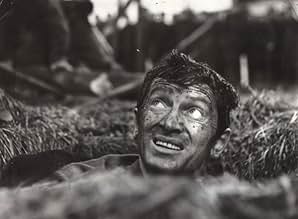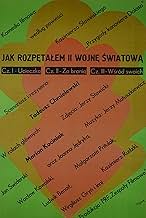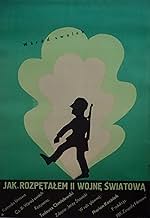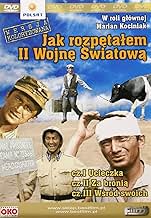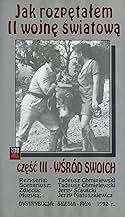Jak rozpetalem druga wojne swiatowa
- 1970
- 3 h 44 min
AVALIAÇÃO DA IMDb
8,1/10
3,9 mil
SUA AVALIAÇÃO
Adicionar um enredo no seu idiomaThe adventures of unlucky Polish soldier Franek Dolas during world war II. In September he escapes from Stalag and goes to France. After that he fights in Africa and Europe.The adventures of unlucky Polish soldier Franek Dolas during world war II. In September he escapes from Stalag and goes to France. After that he fights in Africa and Europe.The adventures of unlucky Polish soldier Franek Dolas during world war II. In September he escapes from Stalag and goes to France. After that he fights in Africa and Europe.
Enredo
Você sabia?
- CuriosidadesThe film is unique in terms of language realism: members of each nationality, encountered by a main hero on his way, speak their own language (German, Serbo-Croatian, French, Italian, English), what makes his adventures and communication problems more realistic.
- Erros de gravaçãoWhen the film was colorized in 2000, the Yugoslav flag was miscolored, with green in the place of blue.
- Citações
Pvt. Franek Dolas: B-but our place is in the Polish army! We must fight for Poland!
Sgt. Kiedros: And for which Poland do you want to fight for?
- Versões alternativasAlso shown in computer colorized version. This version was prepared by "Dynacs Digital" and has never been released theatrically. It was first shown by TV Polsat.
- ConexõesReferenced in Nie lubie poniedzialku (1971)
Avaliação em destaque
The film is one of classic Polish comedies, often aired in Polish TV, and I like it quite much. The main hero is Polish soldier Private Franek Dolas, a charming wangler, who is convinced, that he had started World War Two with his accidental shot (it is a bravura life role of Marian Kociniak). He escapes from a POW camp, and then desperately tries to join the Polish Army, being organized in Great Britain. The film is quite long three-part trilogy, but we follow adventures of Private Dolas from 1 September 1939 towards the end of the war, across Nazi occupied Europe, Middle East and North Africa. And there is also a romance plot in last part.
The whole story is inspired by fates and stories of many Polish soldiers, who escaped from occupied country and got to French or British allies to continue fighting. It was truly a difficult task during the war, because they had to travel illegally through neutral or Nazi-allied countries, avoiding imprisonment or internment. Many of them found themselves eventually in North Africa, where Polish units fought on British side in 1941-1942 against Germans and Italians. One patrol even captured Italian military bordello indeed...
Since Franek Dolas travels through different countries, a humour mainly explores national stereotypes and cultural clashes, but in rather gentle and non-derogatory way. So, the Germans are unable to write down an overcomplicated fake Polish name (Brzeczyszczykiewicz), the Yugoslavians are hospitable, while the British are stiff and care about nothing during a tea time (it also was an experience of Polish soldiers, raised in different culture). On the other hand, the Poles, personalized by the main hero, are reckless and always get into trouble. In fact, Private Dolas succeeds in many things only by accident. French captain is always drunk on wine and wants to fight for Marshall Petain - but on the other hand, his soldiers join the Free French to continue fighting. The Italians try to surrender, or they fight only for their women - but we also see brave Italian commandos. A great and remarkable thing in this film is, that all characters speak their own languages, what makes language barriers obvious, and increases reality feeling.
The film was made as black and white, but gained much thanks to a digital colorization.
The whole story is inspired by fates and stories of many Polish soldiers, who escaped from occupied country and got to French or British allies to continue fighting. It was truly a difficult task during the war, because they had to travel illegally through neutral or Nazi-allied countries, avoiding imprisonment or internment. Many of them found themselves eventually in North Africa, where Polish units fought on British side in 1941-1942 against Germans and Italians. One patrol even captured Italian military bordello indeed...
Since Franek Dolas travels through different countries, a humour mainly explores national stereotypes and cultural clashes, but in rather gentle and non-derogatory way. So, the Germans are unable to write down an overcomplicated fake Polish name (Brzeczyszczykiewicz), the Yugoslavians are hospitable, while the British are stiff and care about nothing during a tea time (it also was an experience of Polish soldiers, raised in different culture). On the other hand, the Poles, personalized by the main hero, are reckless and always get into trouble. In fact, Private Dolas succeeds in many things only by accident. French captain is always drunk on wine and wants to fight for Marshall Petain - but on the other hand, his soldiers join the Free French to continue fighting. The Italians try to surrender, or they fight only for their women - but we also see brave Italian commandos. A great and remarkable thing in this film is, that all characters speak their own languages, what makes language barriers obvious, and increases reality feeling.
The film was made as black and white, but gained much thanks to a digital colorization.
- pibwl
- 12 de jan. de 2018
- Link permanente
Principais escolhas
Faça login para avaliar e ver a lista de recomendações personalizadas
- How long is How I Unleashed World War II?Fornecido pela Alexa
Detalhes
- Data de lançamento
- País de origem
- Idiomas
- Também conhecido como
- How I Unleashed World War II
- Locações de filme
- Zgierz, Lódzkie, Polônia(POW camp)
- Empresa de produção
- Consulte mais créditos da empresa na IMDbPro
- Tempo de duração3 horas 44 minutos
- Cor
- Mixagem de som
- Proporção
- 2.35 : 1
Contribua para esta página
Sugerir uma alteração ou adicionar conteúdo ausente

Principal brecha
By what name was Jak rozpetalem druga wojne swiatowa (1970) officially released in Canada in English?
Responda
